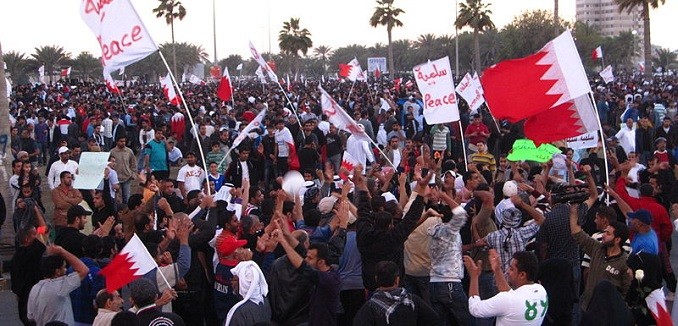The parliament of Bahrain has passed legislation declaring that Hezbollah is a terror group and is calling on both the country’s Foreign Ministry and on Bahrain’s Gulf allies to do the same. The move comes as the death toll in Bahrain’s two-year uprising — which the country accuses Iran of helping to foment — approaches 100 dead and some 3,000 injured.
Bahrain’s internal politics, and of the history of this Hezbollah-related legislation in particular, are tangled. A majority of the island nation’s population is Shiite, while its ruling family and most top government officials are Sunni.
The country’s largest political faction is the Shiite Wefaq party. The party, in turn, is closely linked to Iran and Hezbollah. In a secret 2011 report to U.N. Secretary-General Ban Ki-moon, Bahrain accused Hezbollah of training anti-government rebels in Lebanon and Iran. The report cited extensive ties between Hezbollah chief Hassan Nasrallah and Wefaq leader Ali Salman, a Shiite cleric trained in the Iranian holy city of Qom. Last year, Hezbollah’s Al-Manar television reported that Salman had “confirmed Al-Wefaq’s loyalty to Hezbollah and the armed resistance.”
Arie Amaya-Akkermans, an Istanbul-based analyst who has written extensively about Bahrain, told The Tower, “Until a few years ago the opposition in Bahrain carried Hezbollah flags in their marches rather than Bahrain’s, but they later changed the strategy, perhaps a strategy appealing to a more Western-minded public. On Iranian state TV the uprising in Bahrain is described almost as a civil war while Syria is completely ignored.
“There’s a conflict going on between Iran and the Gulf states… The political demands changed from further political participation to toppling the monarchy and replace it by a ‘democratic’ state, which probably means as democratic as Egypt or Iran,” he said. “The fact that members of opposition speak about Hezbollah as a bastion of the opposition in Beirut and defending Arab interests against Israel says a lot about the complex network of influences of Hezbollah throughout the Arab world.”
Tehran claims all of Bahrain as Iranian territory and has been accused of trying to politically destabilize the government. At top Iranian official, Hojjat al-Eslam Yadollah Shir Mardi, recently blasted the Bahraini and Qatari [Persian] governments during a conference titled the “Regional Ulama and Clergymen Summit to Support the Oppressed Bahraini People.” Iranian Supreme Leader Ayatollah Ali Khamenei even has an image of himself on his Facebook page next to the words “We stood by the Palestiniant [sic] nation; we stood by the nation of Bahrain.”
Earlier this year the Wefaq bloc resigned from Bahrain’s parliament. The Islamist party had held nearly half of the parliament’s 40 seats, and its resignation paved the way for the resolution. The move is in line with broader condemnation by Bahrain and its Gulf allies over Iran’s promotion of promoting terrorism in the region:
Arab interior ministers gathered for a security meeting in Riyadh on Wednesday accused Iran of supplying “logistic help to terrorist operations” in Bahrain and Yemen. In a statement, the ministers “strongly denounced logistic aid supplied by Iran to terrorist operations in Bahrain and Yemen,” and congratulated security services in both countries for “dismantling cells and uncovering dangerous terror plots.” In February, Sunni-ruled but Shiite-majority Bahrain accused the Islamic republic across the Gulf of training, arming and financing a “terrorist cell” which the authorities had busted, an accusation Tehran denied.
Gulf states, fearing the immunity that nuclear weapons would provide Iran in its promotion of regional terrorism, have long called for military action against Tehran’s nuclear program. In 2010, the United Arab Emirates Ambassador to the United States Yousef al-Otaiba argued for an attack, insisting that the benefits of bombing Iran’s nuclear program outweighed the short-term costs:
“I think it’s a cost-benefit analysis,” Mr. al-Otaiba said. “I think despite the large amount of trade we do with Iran, which is close to $12 billion … there will be consequences, there will be a backlash and there will be problems with people protesting and rioting and very unhappy that there is an outside force attacking a Muslim country; that is going to happen no matter what.” “If you are asking me, ‘Am I willing to live with that versus living with a nuclear Iran?,’ my answer is still the same: ‘We cannot live with a nuclear Iran.’ I am willing to absorb what takes place at the expense of the security of the U.A.E.”
Wikileaks documents indicate that the Saudis were making a similar case as early as 2008:
King Abdullah of Saudi Arabia has repeatedly urged the United States to attack Iran to destroy its nuclear programme, according to leaked US diplomatic cables that describe how other Arab allies have secretly agitated for military action against Tehran… The Saudi king was recorded as having “frequently exhorted the US to attack Iran to put an end to its nuclear weapons programme”, one cable stated. “He told you [Americans] to cut off the head of the snake,” the Saudi ambassador to Washington, Adel al-Jubeir said, according to a report on Abdullah’s meeting with the US general David Petraeus in April 2008.
Earlier this month Saudi Foreign Minister Saud al-Faisal emphasized that open-ended negotiations with Iran over its nuclear program would enable the regime to acquire nuclear weapons, and that “we cannot allow this to happen.”
[Photo: Al Jazeera English / Wiki Commons]




